|
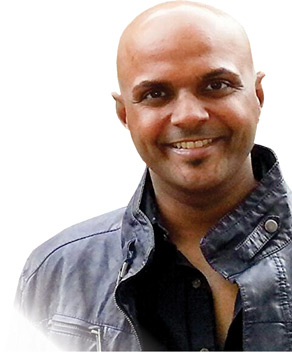
Jehan Aloysius |
Reality Show!
Life’s darkest secrets on stage
By Anuradha Kodagoda
The CentreStage Productions and Jehan Aloysius have long been
regarded as the producers of ground-breaking new plays. Their latest
production is the Reality Show!
The Centre Stage productions have been featured on the BBC and CNN.
They have been staged in parts of Sri Lanka and other countries. Their
work include hard-hitting serious theatre, comedies, original musicals,
Shakespearian adaptations and even ‘inclusive’ ballet productions with
disabled soldiers and performers.
The productions have been studied by university students over the
years and they have been the subject of dissertations and even a
doctorate thesis by international students.
Aloysius feels his newest work, Reality Show!, will be equally
groundbreaking. The debut Sinhala language production is an experimental
work devised and written entirely during the duration of regular
workshop sessions with a cast of well-known artistes and newcomers.
The show is sponsored by Mahinda Dias Engineers. The lighting is by
Thushan Dias and music is composed by Jehan Aloysius. Reality Show! is
more suitable for adult audiences due to its mature themes and language.
In an interview with Montage the award-winning actor-cum-director
Jehan Aloysius speaks about Reality Show!
Excerpts:
Question: What is ‘Reality Show!’ about?
Answer: Reality Show! is a play about performances and
performers. In very simplistic form it’s about a group of actors who
represent various characters in society.
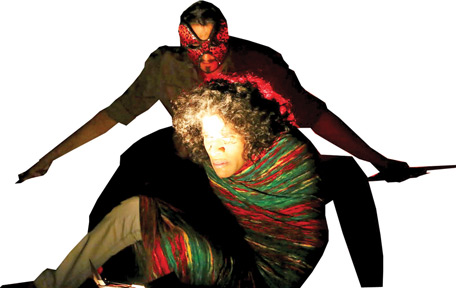 The director forces them to perform their darkest secrets on stage.
Most of the stories have been told to me by people. It also has some of
my personal experiences as well as some of the experiences of the cast. The director forces them to perform their darkest secrets on stage.
Most of the stories have been told to me by people. It also has some of
my personal experiences as well as some of the experiences of the cast.
The show has many recurring themes which include the ‘construction’
and destruction of identity in its many forms, as well as the symbiotic
relationship between the performer and their audience.
These are presented using a variety of theatre techniques and
narrative devices, since they are stories told by characters in their
own personal style.
This results in several unique mini ‘plays-within-the play’, which
are bound together by a central plot which I describe simply as, “a
nightmare version of A Chorus Line”. Some of the theatre styles also
consciously evoke some of my signature techniques of my past
productions.
Sinhala theatre
Q: What made you to step into the Sinhala theatre?
A: I was invited by Thushan Dias to create something for the
Sinhala theatre, especially to give the actors the techniques of English
theatre.
The traditions of English theatre and Sinhala theatre are slightly
different. In the Sinhala theatre there are a guru and a hierarchy which
is not common in the English theatre where we consider everyone equal.
My task was to develop the skills of the actors. Some of them have made
a name for themselves.
There was an era when the Sinhala theatre and English theatre were
not separate. In the 70s and 80s Irangani Serasinghe, Henry Jayasena and
Richard De Zoysa were part of both the theatres.
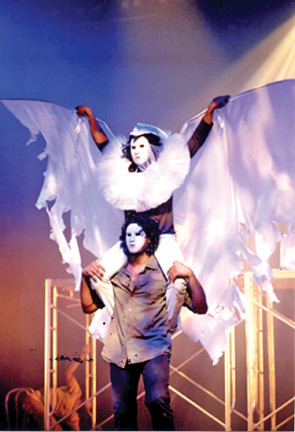 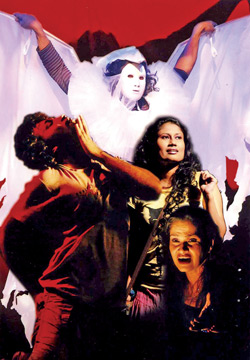 Later due to many reasons a separation between the two took place.
I’m trying to bring back the lost identity to Sri Lankan theatre without
separating them as Sinhala or English theatre. Later due to many reasons a separation between the two took place.
I’m trying to bring back the lost identity to Sri Lankan theatre without
separating them as Sinhala or English theatre.
Sri Lankan theatre depends on translations or adaptations which are a
barrier to develop our own type of theatre to discuss our own
socio-political issues.
When you do translations or adaptations you are taking a circular
route to discuss local issues. The language is quite important and I
used the simplest terms to discuss the issues in my production.
Process
Q: What’s the process of making the Reality Show?
A: For the past seven months the newcomers to CentreStage
Productions have been developing their skills under my guidance to
grapple with the challenges of grasping new techniques.
The Reality Show! was created through a combination of structured
workshops and theatre techniques which inspired the multiple drafts of
my original script written in English and Sinhala.
The cast includes popular stage and screen actors such as Nilmini
Buwenaka, Sulochana Weerasinghe, Charith Senanayake, Sarath Karunaratne,
Thilanka Gamage and newcomers such as Anuradha Mallawa Archachci,
Sudharshana Krishantha and Akalanka Prabhashwara.
The play consists of seven narrative styles for the seven characters.
For instance, stories are told through monologue, black box style,
thriller, stylistic play, over-blown singing, dancing, folk tale style
and finally using puppets. It is quite a challenging task for me as well
as the cast.
The play is performed by an ensemble of eight outstanding performers
who have risen to the demands of performing all aspects of the play with
aplomb.
As in all my productions, priority is given to the performers and
their skills, rather than frivolous sets and costumes.
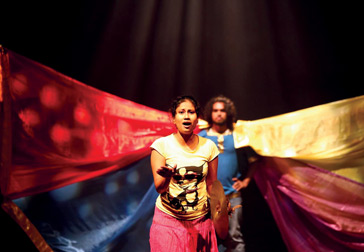 The cast has seen their share of blood, sweat and tears during the
creation deeply rooted in real situations and events. The cast has seen their share of blood, sweat and tears during the
creation deeply rooted in real situations and events.
Experience
Q: As a director and actor who have ample experience with
English speaking audience and their responses, what is your idea about
Sinhala- speaking audience and their feel of theatre?
A: The Sinhala theatre audience is larger than the English
theatre audience. I have seen every genre of Sinhala plays and what I
have noticed is that there’s a difference between Sinhala and English
theatre audiences.
For instance, in the English theatre the audience never answer their
mobile phones in the middle of the play but it happens in the Sinhala
theatre audience.
It’s because of the teledrama tradition where the mega teledramas go
on forever there’s no harm by missing one single scene.
They are bringing the same practice to the theatre as well.
This is common with English theatre as well due to the cable TV.
I wanted to create an audience with more interaction. I expect three
things from the audience, that is to interact, interpret and
interrogate.
It doesn’t matter if they disagree or get angry with the play.
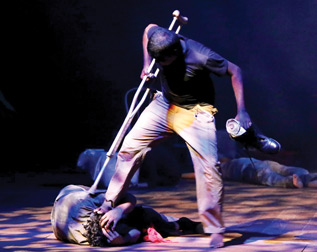 We want theatre to continue after they leave the hall and we want to
open the mindset of the people and encourage a debate. We want theatre to continue after they leave the hall and we want to
open the mindset of the people and encourage a debate.
That’ll be the only way that we can entice the lost audience back to
the serious theatre.
Q: When directing a play what do you expect from the actors?
A: Once they know their lines they think it’s all done and
they are completely depend on the prompter. For the past 14 years the
CenterStage productions have never used prompters in the shows because I
strictly believe that actors need to know their roles and lines. If they
get stuck somewhere they should find a solution within the character and
continue.
I have seen many productions in my life the prompter has became the
centre of the play and he’s determined the rhythm of the play and he’s
the one who controls and direct the characters on the stage not the
director, which I never let it happen in my plays.
Acting is not just parroting lines. It’s about knowing why you are
saying it. I want my actors to know why they say each and every line of
the play and gradually I mould them into the characters which are in the
script. |

